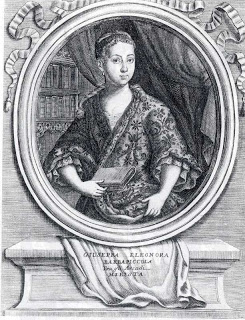Giuseppa Barbapiccola facts for kids
Giuseppa Eleonora Barbapiccola (born 1702 – died around 1740) was a very smart Italian woman. She studied nature, wrote poems, and translated important books.
She is most famous for translating a big book called Principles of Philosophy by René Descartes into Italian in 1722. In the introduction to her translation, Giuseppa argued that women were just as smart as men. Many people back then thought women weren't as clever, but Giuseppa said it was only because they didn't get the same chances for education. Smart people in Naples said she was the one who helped bring Cartesianism (Descartes' ideas) to Italy.
Giuseppa's Early Life
Giuseppa was likely born in Naples, Italy. Her family might have been from a nearby city called Salerno. Her uncle, Tommaso Maria Alfani, was a well-known preacher in Naples. He also wrote letters to a famous philosopher named Giambattista Vico. We don't know much about her parents, but her uncle probably helped her get an education and learn a lot.
Giuseppa was part of a special group of thinkers and artists called the Accademia degli Arcadi in Bologna. Her special name in this group was Myristic. She often wrote poems with her friend, Luisa Vico.
How Giuseppa Learned
We don't know if Giuseppa went to a formal school. It's thought that she learned a lot by talking with smart people in Naples. These discussions often happened in special gatherings called "salons."
She probably learned most of her knowledge at the home of the Italian philosopher Giambattista Vico. He was the father of her close friend, Luisa Vico. From the letters she wrote to Luisa and Giambattista Vico, we know she was a good friend of the Vico family. She was also a well-known person in the smart groups of Naples.
Why Education for Girls Matters
In 1722, Giuseppa published her translation of René Descartes' Principles of Philosophy. She wrote a long introduction to this book. In it, she strongly defended how smart women are. She also argued that women should have the right to get a good education. She believed women should be able to share their ideas in a world mostly led by men.
She started by saying sorry for her translation. Then, she defended it against people who thought women were not smart enough. Some famous thinkers like Homer, Herodotus, and Claude Fleury had said women were less intelligent.
Giuseppa then listed many women throughout history who achieved great things. She mentioned people like Daphne, Diotima, Queen Christina of Sweden, and Anne Lefevre. She also wanted to spread Descartes' ideas, because he believed women could be just as smart as men. She dedicated her translation to Queen Elizabeth Stuart of Bohemia. Descartes himself had many deep conversations about philosophy with Queen Elizabeth.
But then if one looks carefully and clearly, women should not be excluded from the study of the sciences, since their spirits are more elevated and they are not inferior to men in terms of the greatest virtues."
Giuseppa wrote her translation especially for women. She wanted to fix the problems with how girls were usually taught. Back then, girls often only learned things like the Catechism, sewing, singing, dancing, fashion, and polite talk. Instead, Giuseppa wanted to teach them Descartes' clear and logical way of thinking and learning.
See also
 In Spanish: Giuseppa Barbapiccola para niños
In Spanish: Giuseppa Barbapiccola para niños
 | Aurelia Browder |
 | Nannie Helen Burroughs |
 | Michelle Alexander |


